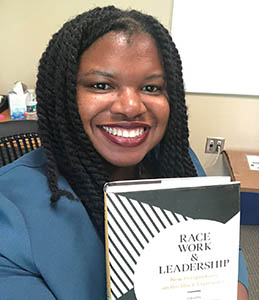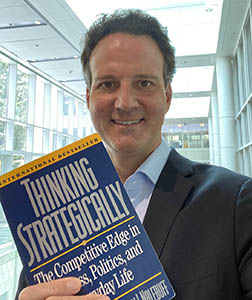Books that Shaped Professors
Books that Shaped Professors

Professors measure success in “aha” moments — when a concept crystalizes into understanding for students.
But before faculty can create those moments, they usually experience “aha” moments themselves — often from books. Below Fuqua professors share the business books that have shaped their understanding of key concepts, and explain why they would recommend them to anyone interested in business.
 “Race, Work and Leadership: New Perspectives on the Black Experience”
“Race, Work and Leadership: New Perspectives on the Black Experience”
edited by Laura Morgan Roberts, Anthony J. Mayo, and David A. Thomas
recommended by Angelica Leigh, management professor
"I recommend this book for MBA students who are interested in becoming well versed in issues related to diversity and inclusion in the workplace. This book is a compilation of essays written by leading academics and practitioners that provides research-backed accounts of the Black experience within modern day workplaces. This book has been very informative for me in my own research and also in thinking through new research projects that examine race in the workplace. It’s a valuable guide for MBA students that are committed to understanding and building inclusive organizations."
 “Thinking Strategically: The Competitive Edge in Business, Politics, and Everyday Life”
“Thinking Strategically: The Competitive Edge in Business, Politics, and Everyday Life”
by Avinash K. Dixit and Barry J. Nalebuff
recommended by David Ridley, strategy professor
"I read 'Thinking Strategically' decades ago and it remains one of my favorite books. As a graduate student, 'Thinking Strategically' opened my eyes to how game theory could be applied in business, policy, sports and life. The authors are great at making game theory accessible and fun for a broad audience. I used the book to teach a three-week summer course in game theory to high school students."
 “The Idea Factory: Bell Labs and the Great Age of American Innovation”
“The Idea Factory: Bell Labs and the Great Age of American Innovation”
by Jon Gertner
recommended by Sharique Hasan, strategy professor
"Any MBA that wants to work for (or start!) a company that tries fundamentally to bring new products and services into the world needs to read this book. Bell Labs was one of the most innovative organizations the world has ever seen, and there are many lessons we can learn from its history."
 “Creative Confidence: Unleashing the Creative Potential Within Us All”
“Creative Confidence: Unleashing the Creative Potential Within Us All”
by Tom Kelley and David Kelley
recommended by Jamie Jones, management professor and executive director for Fuqua’s Center for Entrepreneurship and Innovation
"Your value to an employer is proportional to the size of problems you can solve. In today’s fast-paced, dynamic business environment, innovation and creativity are required to solve problems and identify new opportunities that will fuel growth. While not everyone identifies as a 'creative type,' we are all innately creative, but may need to rekindle the creativity we intuitively embraced as children.
In 'Creative Confidence,' Kelley and Kelley remind us that we are all, in fact, natural innovators. They provide insights and exercises for how to unleash your creative mindset to tackle challenges of all types."
“The Color of Money: Black Banks and the Racial Wealth Gap”
by Mehrsa Baradaran
recommended by Jeremy Petranka, economics professor and senior associate dean for Executive MBA and Quantitative Management Programs.
"As an economist, I thought I had a strong handle on U.S. economic policies. This book more fully opened my eyes to the fact that America does not consist of a single economy. Instead, financial institutions and policies exist that have historically and currently led to the perpetuation of rational inequalities centered on the persistence of the wealth gap. This book’s deep and comprehensive analysis provides a pivotal understanding that every executive, economist and citizen should understand."
 “Decisive: How to Make Better Choices in Life and Work”
“Decisive: How to Make Better Choices in Life and Work”
by Chip Heath and Dan Heath
recommended by Richard Larrick, management and organizations professor and associate dean for diversity, equity, and inclusion
"We’re not as rational as we think. That’s the main conclusion from many years of research in cognitive psychology and behavioral economics. And there are many great books summarizing the biases and flaws that can arise in our decisions. It is the rare book, however, that uses biases and flaws as the starting point to tell us about specific steps we can take to make better decisions. 'Decisive' is that book. It is written in an engaging way with lots of great examples (a hallmark of the Heath brothers*).
Most importantly, it gives you concrete advice for thinking clearly about your decisions. It is tempting to equate decision-making with putting numbers in an Excel sheet. The heart of good decision-making, however, is a process – a process of asking the right question, understanding our assumptions, thinking broadly, and using emotion and advice in the right way. 'Decisive' gives practical advice for doing each of these things more creatively and effectively."
*Dan Heath is a senior fellow with Fuqua’s Center for the Advancement of Social Entrepreneurship (CASE) and his brother, Chip Heath, taught at Fuqua from 1997 to 2000.
